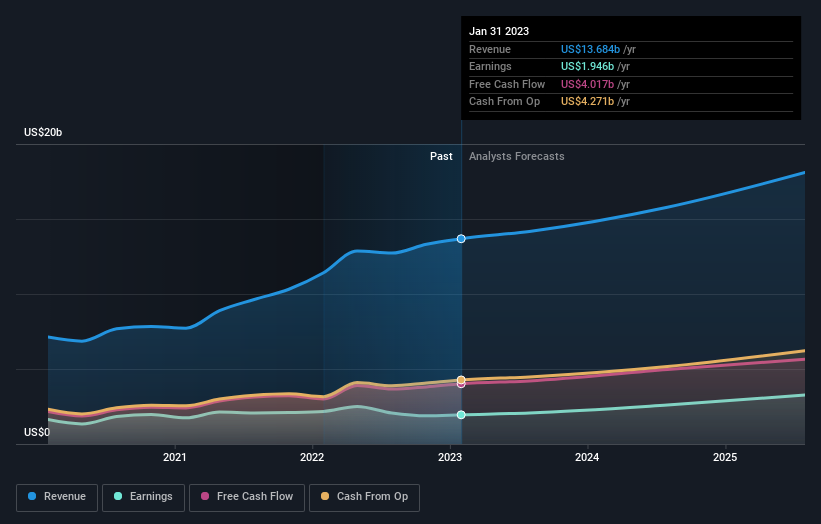- United States
- /
- Software
- /
- NasdaqGS:INTU
After losing 13% in the past year, Intuit Inc. (NASDAQ:INTU) institutional owners must be relieved by the recent gain
Key Insights
- Institutions' substantial holdings in Intuit implies that they have significant influence over the company's share price
- 50% of the business is held by the top 23 shareholders
- Recent sales by insiders
If you want to know who really controls Intuit Inc. (NASDAQ:INTU), then you'll have to look at the makeup of its share registry. And the group that holds the biggest piece of the pie are institutions with 85% ownership. That is, the group stands to benefit the most if the stock rises (or lose the most if there is a downturn).
Last week's US$5.9b market cap gain would probably be appreciated by institutional investors, especially after a year of 13% losses.
In the chart below, we zoom in on the different ownership groups of Intuit.
Check out our latest analysis for Intuit

What Does The Institutional Ownership Tell Us About Intuit?
Many institutions measure their performance against an index that approximates the local market. So they usually pay more attention to companies that are included in major indices.
As you can see, institutional investors have a fair amount of stake in Intuit. This suggests some credibility amongst professional investors. But we can't rely on that fact alone since institutions make bad investments sometimes, just like everyone does. It is not uncommon to see a big share price drop if two large institutional investors try to sell out of a stock at the same time. So it is worth checking the past earnings trajectory of Intuit, (below). Of course, keep in mind that there are other factors to consider, too.

Investors should note that institutions actually own more than half the company, so they can collectively wield significant power. We note that hedge funds don't have a meaningful investment in Intuit. The company's largest shareholder is The Vanguard Group, Inc., with ownership of 8.9%. Meanwhile, the second and third largest shareholders, hold 8.4% and 5.9%, of the shares outstanding, respectively.
Looking at the shareholder registry, we can see that 50% of the ownership is controlled by the top 23 shareholders, meaning that no single shareholder has a majority interest in the ownership.
While studying institutional ownership for a company can add value to your research, it is also a good practice to research analyst recommendations to get a deeper understand of a stock's expected performance. Quite a few analysts cover the stock, so you could look into forecast growth quite easily.
Insider Ownership Of Intuit
The definition of an insider can differ slightly between different countries, but members of the board of directors always count. Company management run the business, but the CEO will answer to the board, even if he or she is a member of it.
I generally consider insider ownership to be a good thing. However, on some occasions it makes it more difficult for other shareholders to hold the board accountable for decisions.
Our most recent data indicates that insiders own some shares in Intuit Inc.. The insiders have a meaningful stake worth US$3.2b. we sometimes take an interest in whether they have been buying or selling.
General Public Ownership
The general public, who are usually individual investors, hold a 12% stake in Intuit. While this size of ownership may not be enough to sway a policy decision in their favour, they can still make a collective impact on company policies.
Next Steps:
While it is well worth considering the different groups that own a company, there are other factors that are even more important. Be aware that Intuit is showing 1 warning sign in our investment analysis , you should know about...
Ultimately the future is most important. You can access this free report on analyst forecasts for the company.
NB: Figures in this article are calculated using data from the last twelve months, which refer to the 12-month period ending on the last date of the month the financial statement is dated. This may not be consistent with full year annual report figures.
New: AI Stock Screener & Alerts
Our new AI Stock Screener scans the market every day to uncover opportunities.
• Dividend Powerhouses (3%+ Yield)
• Undervalued Small Caps with Insider Buying
• High growth Tech and AI Companies
Or build your own from over 50 metrics.
Have feedback on this article? Concerned about the content? Get in touch with us directly. Alternatively, email editorial-team (at) simplywallst.com.
This article by Simply Wall St is general in nature. We provide commentary based on historical data and analyst forecasts only using an unbiased methodology and our articles are not intended to be financial advice. It does not constitute a recommendation to buy or sell any stock, and does not take account of your objectives, or your financial situation. We aim to bring you long-term focused analysis driven by fundamental data. Note that our analysis may not factor in the latest price-sensitive company announcements or qualitative material. Simply Wall St has no position in any stocks mentioned.
About NasdaqGS:INTU
Intuit
Provides financial management, compliance, and marketing products and services in the United States.
Flawless balance sheet with solid track record and pays a dividend.
Similar Companies
Market Insights
Community Narratives





